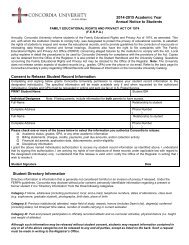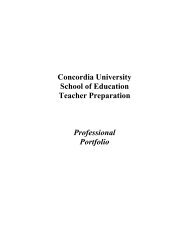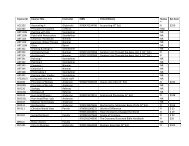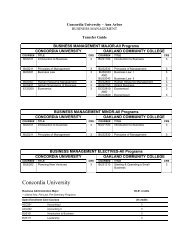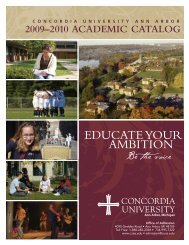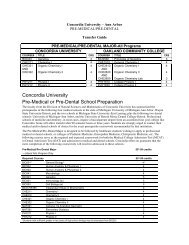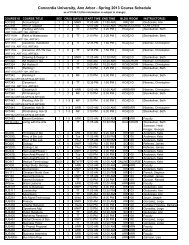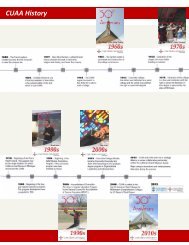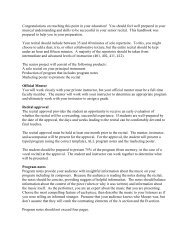2006â2007 Academic Catalog - Concordia University Ann Arbor
2006â2007 Academic Catalog - Concordia University Ann Arbor
2006â2007 Academic Catalog - Concordia University Ann Arbor
Create successful ePaper yourself
Turn your PDF publications into a flip-book with our unique Google optimized e-Paper software.
130 |<br />
COURSE DESCRIPTIONS<br />
CSC241 Introduction to Data Processing credits: 3<br />
A practical introduction to computers for the pre-professional, including a survey of computer<br />
hardware and software, and skill development in using word processing, spreadsheet,<br />
database management, and presentation software, and integrating these applications.<br />
PREREQUISITES: GST151<br />
CSC257 LLP credits: 0<br />
The student has the opportunity to earn credit by writing a college-level paper reflecting<br />
learning in this subject through experience, reflection, concept formation, and application<br />
of those concepts to new situations. The paper is evaluated by a <strong>Concordia</strong> faculty member.<br />
CSC258 PST credits: 0<br />
The student petitions to gain academic credit through verification of completed collegelevel<br />
training (seminars, workshops, licenses, apprenticeships, etc.) conducted in a non-collegiate<br />
setting. The petition is evaluated by a <strong>Concordia</strong> faculty member.<br />
CSC295 Independent Study in Computer Science credits: 1<br />
Sophomore level independent study.<br />
CSC351 Computer Science I credits: 3<br />
Students explore elementary computer science concepts such as algorithm development,<br />
data types, and structured programming using C++. Every student is expected to work at<br />
least three hours per week outside of class with a computer.<br />
PREREQUISITES: MAT111 or MAT112 or MAT221<br />
CSC352 Computer Science II credits: 3<br />
A continuation of CSC351, structured and object oriented programming concepts, program<br />
debugging and testing, string processing, internal searching and sorting, data structures, algorithms,<br />
abstract data types, and recursion using C++. Offered every other year. Every student<br />
is expected to work at least three hours per week outside of class with a computer.<br />
PREREQUISITES: CSC351<br />
CSC395 Independent Study in Computer Science credits: 1<br />
Junior level independent study.<br />
DAN257 LLP credits: 0<br />
The student has the opportunity to earn credit by writing a college-level paper reflecting<br />
learning in this subject through experience, reflection, concept formation, and application<br />
of those concepts to new situations. The paper is evaluated by a <strong>Concordia</strong> faculty member.<br />
DAN258 PST credits: 0<br />
The student petitions to gain academic credit through verification of completed collegelevel<br />
training (seminars, workshops, licenses, apprenticeships, etc.) conducted in a non-collegiate<br />
setting. The petition is evaluated by a <strong>Concordia</strong> faculty member.<br />
ECE201 Foundations of Early Childhood Ed credits: 3<br />
Provides an overview of purposes, philosophy, programs, and issues related to the care and<br />
education of children (ages birth through eight) including 'developmentally appropriate<br />
practices,' professionalism, and ethical standards.<br />
ECE310 Assessment of Young Children credits: 3<br />
Purposes and techniques of formal and informal assessment, including observation, analysis<br />
and reporting of results; the application of assessment data in planning developmentally<br />
appropriate activities for children. Prerequisite: Admission to the School of Education<br />
PREREQUISITES: EDU220 and EDU301 and EDU302 and PSY211<br />
ECE320 Planning Instruction for Young Children credits: 2<br />
Creation and evaluation of curriculum and instructional units and activities that are



